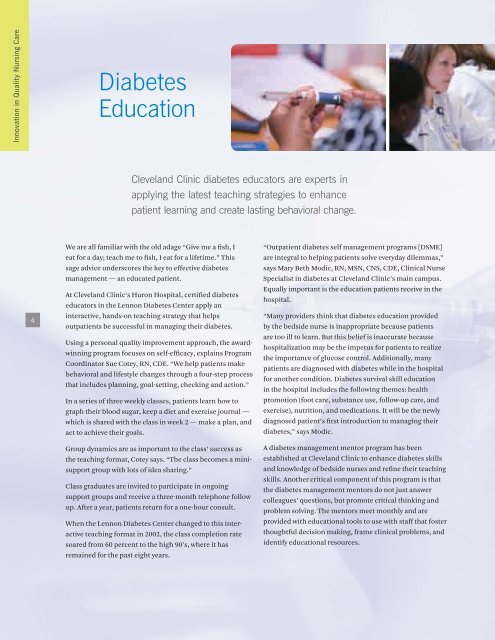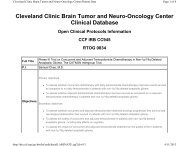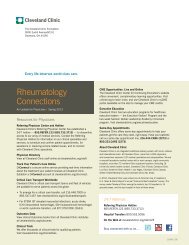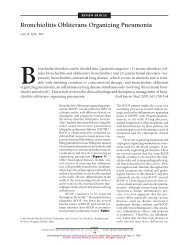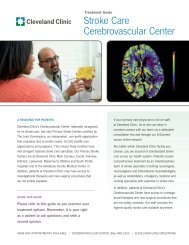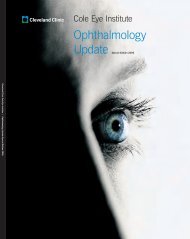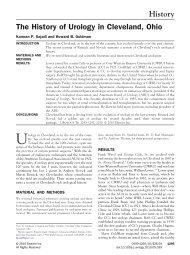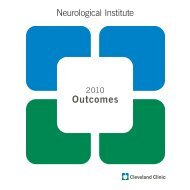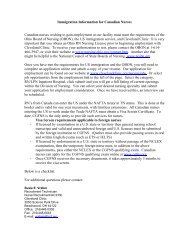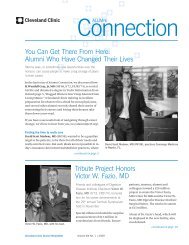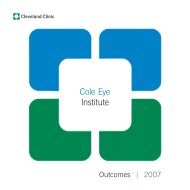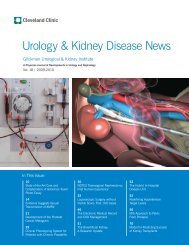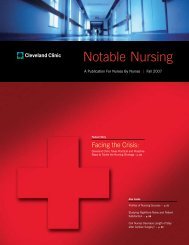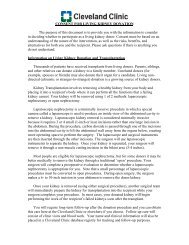Notable Nursing - Cleveland Clinic
Notable Nursing - Cleveland Clinic
Notable Nursing - Cleveland Clinic
You also want an ePaper? Increase the reach of your titles
YUMPU automatically turns print PDFs into web optimized ePapers that Google loves.
We are all familiar with the old adage “Give me a fish, I<br />
eat for a day; teach me to fish, I eat for a lifetime.” This<br />
sage advice underscores the key to effective diabetes<br />
management — an educated patient.<br />
At <strong>Cleveland</strong> <strong>Clinic</strong>’s Huron Hospital, certified diabetes<br />
educators in the Lennon Diabetes Center apply an<br />
interactive, hands-on teaching strategy that helps<br />
outpatients be successful in managing their diabetes.<br />
Using a personal quality improvement approach, the awardwinning<br />
program focuses on self-efficacy, explains Program<br />
Coordinator Sue Cotey, RN, CDE. “We help patients make<br />
behavioral and lifestyle changes through a four-step process<br />
that includes planning, goal-setting, checking and action.”<br />
In a series of three weekly classes, patients learn how to<br />
graph their blood sugar, keep a diet and exercise journal —<br />
which is shared with the class in week 2 — make a plan, and<br />
act to achieve their goals.<br />
Group dynamics are as important to the class’ success as<br />
the teaching format, Cotey says. “The class becomes a minisupport<br />
group with lots of idea sharing.”<br />
Class graduates are invited to participate in ongoing<br />
support groups and receive a three-month telephone follow<br />
up. After a year, patients return for a one-hour consult.<br />
When the Lennon Diabetes Center changed to this interactive<br />
teaching format in 2002, the class completion rate<br />
soared from 60 percent to the high 90’s, where it has<br />
remained for the past eight years.<br />
“Outpatient diabetes self management programs [DSME]<br />
are integral to helping patients solve everyday dilemmas,”<br />
says Mary Beth Modic, RN, MSN, CNS, CDE, <strong>Clinic</strong>al Nurse<br />
Specialist in diabetes at <strong>Cleveland</strong> <strong>Clinic</strong>’s main campus.<br />
Equally important is the education patients receive in the<br />
hospital.<br />
“Many providers think that diabetes education provided<br />
by the bedside nurse is inappropriate because patients<br />
are too ill to learn. But this belief is inaccurate because<br />
hospitalization may be the impetus for patients to realize<br />
the importance of glucose control. Additionally, many<br />
patients are diagnosed with diabetes while in the hospital<br />
for another condition. Diabetes survival skill education<br />
in the hospital includes the following themes: health<br />
promotion (foot care, substance use, follow-up care, and<br />
exercise), nutrition, and medications. It will be the newly<br />
diagnosed patient’s first introduction to managing their<br />
diabetes,” says Modic.<br />
A diabetes management mentor program has been<br />
established at <strong>Cleveland</strong> <strong>Clinic</strong> to enhance diabetes skills<br />
and knowledge of bedside nurses and refine their teaching<br />
skills. Another critical component of this program is that<br />
the diabetes management mentors do not just answer<br />
colleagues’ questions, but promote critical thinking and<br />
problem solving. The mentors meet monthly and are<br />
provided with educational tools to use with staff that foster<br />
thoughtful decision making, frame clinical problems, and<br />
identify educational resources.


